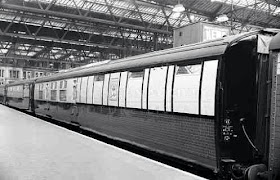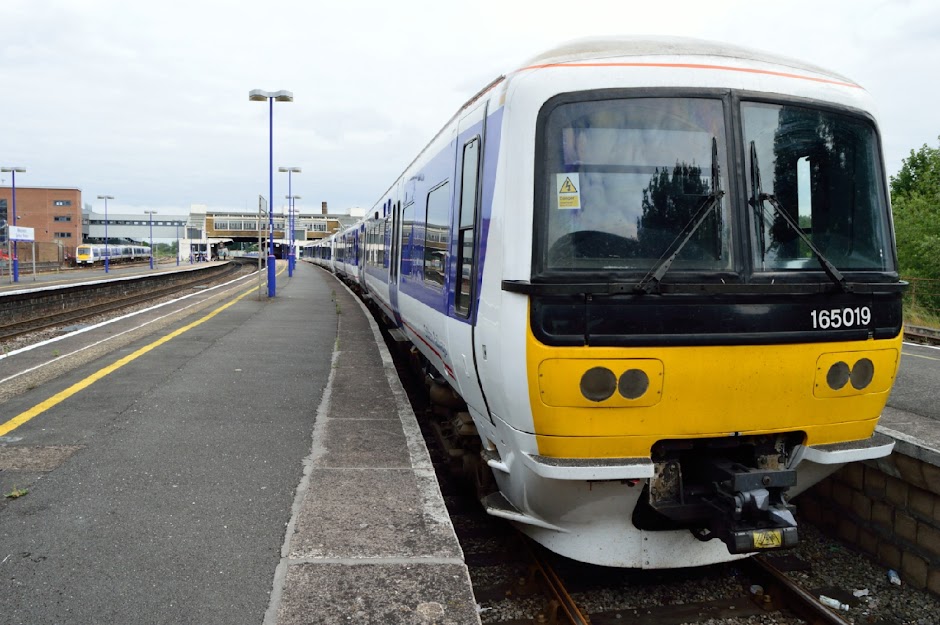Southern Railway Tavern Coach, Waterloo Station
 |
| Tavern Coach at Waterloo With Exterior 'Brickwork' |
A
bar serving alcohol on a train has, in some guise or other, been a
feature of railway travel for countless decades. But, imagine if it
were possible to have not only a mere bar on your train – but a
tavern!
A real pub that ran on rails providing the same amenities as
your local – beer, wine, spirits, bar snacks or a meal. Somewhere
to relax, chat with friends or a work colleague in a convivial
atmosphere while enjoying a drink on the way home after a hard day at
the office.
Well,
the notion of such a scheme is not as far-fetched as one might
imagine. In fact, more than simply a fanciful idea, it was a reality
for a time on the Southern Railway during what is now regarded by
many as the 'golden age of steam'.
 |
| West Country Class Locomotive 34016 'Bodmin' Designed by Oliver Bulleid |
Photo: Charles Moorhen
In
addition to steam locomotives, he also designed coaches for the Southern
Railway. And in 1949 he hit upon the radical idea of providing a
better, classier refreshment car than those in use at the time.
Oliver
Bulleid's idea was to create a tavern.
Between
1949 and 1951, Bulleid took the standard buffet/refreshment car and
gutted the whole interior. He then furnished the entire carriage in
a style similar to that of a typical English country tavern. It is
believed that he modelled his 'tavern' on The Chequers Inn at
Pulborough, Sussex.
 |
| Interior and Bar of a Bulleid Tavern car |
Internally,
the 'tavern' compartment consisted of a low ceiling with the addition
of fake oak beams. Settles and benches abutted onto panelled or
rough-rendered walls.
Long
narrow leaded windows were set high up in the carriage sides and
illumination came from miniatures of the carriage- lamp type; beloved
of the 'semi-detached' middle classes of the time.
The
bar, solely made from wood, provided everything a tavern, or inn,
would offer; including draught and bottled beer.
All
that was missing were the horse brasses and a blazing log fire in an
open hearth.
 |
| Scale Model of a Bulleid Tavern Car Showing 'Brickwork', Leaded Windows and Pub Sign |
The
external decoration was a joy to behold. The usual Southern Railway
paintwork was removed and replaced with a totally unique design. The
outside of the coach was divided horizontally. The bottom half
looked like brickwork, while the top half was coloured cream
intersected by black timbering (much like that seen on the old wood panelled shooting-brake cars).
To
top everything off, the cream and timber section displayed a
pictorial pub sign panel with lettering saying, 'At
the sign of the Jolly Jack Tar',
(or 'At the sign of the
White Horse/George and Dragon/Red Lion'
etc.).
Four
of 'Bulleid's Taverns' became a reality and were subsequently put
into service.
On
the whole the public enjoyed travelling and drinking in a
'pub-on-wheels'; however, there were dark clouds gathering on the
horizon.
The
'Bulleid Taverns' became a hot topic for debate in the House ofCommons, where the majority of MPs denounced the unusual coaches as
nothing more than “shoddy Tudoresque monstrosities”. A letter of
protest, published in The
Times,
was signed by heads of the Victoria and Albert Museum, the Royal
College of Art, the Council of Industrial Design and the Institute of
Contemporary Arts.
JamesCallaghan MP, who was at the time Parliamentary Secretary to the
Ministry of Transport, went on to say that “nobody
likes these tavern cars except for the public”.
(A rather pompous remark when one considers that it was the public
that were using them).
Regardless
of the opinions of those in power, who had totally misjudged the
popular mood, the taverns remained in service for around ten years
with their interiors intact before being returned to the standard
design of the time. The highly controversial 'brickwork' however was
removed within a couple of years of entering service. (Pressure from
above, maybe?).
Bulleid's
Taverns may have been a bit outlandish, some may even say tacky; but
they came at a time when Britain was devoid of colour and originality
as it struggled to recover from the deprivation of the war years.
It
seems a shame that no examples of the Bulleid Tavern survived to the
present day. Perhaps our modern railways could have learned a thing
or two about pleasing the public.
Bulleid Railway Tavern Coach on YouTube:
Tavern On The Train (1949). British Pathe.
Don't forget to subscribe to 'Along These Tracks' railway blog to get all new posts and updates sent directly to you.
Blog update:
Previous photo posts are now easier to find.
All blog posts are now listed alphabetically on the right side of your screen; under the heading, 'Previous Photo Posts'.
"I hope this makes your search easier".












